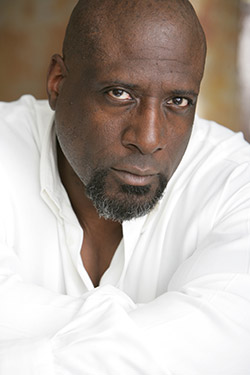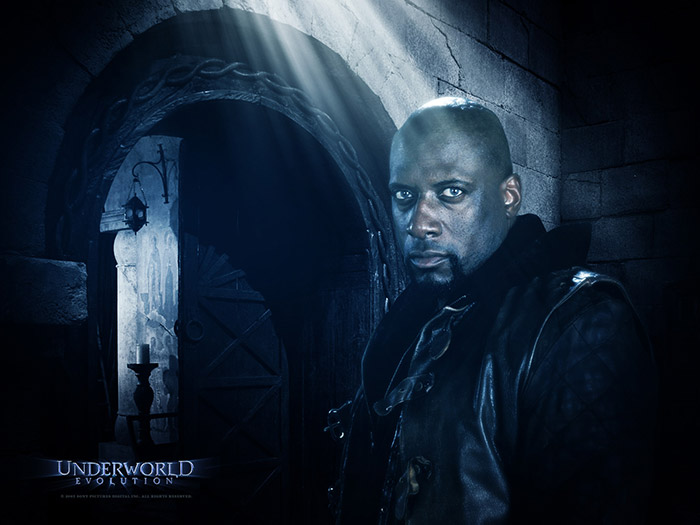The Hollywood experiment
Every actor has that breakthrough moment when he or she knows that acting is life’s calling. For some, it’s the magical lure of stardom; others are inspired after witnessing a seminal performance. For Kevin Grevioux, creator and star of the “Underworld” film series, it was an overheard conversation in a laboratory at the National Cancer Institute that changed the course of his life.
 Kevin Grevioux
Kevin Grevioux
While working on his master’s degree at Howard University, Grevioux was serving as a research assistant at the NCI. One day, he heard a freshly minted Ph.D. talking to someone else in the lab. “She mentioned that at 30 years old, she wasn’t even making $30,000,” recalls Grevioux. “I was thinking, ‘Here I am, 24 or 25 years old. How long is it going to take me to finish the master’s program and then get my Ph.D.? What kind of money am I realistically looking at making?’”
The depressing mental calculations sealed Grevioux’s decision to abandon the lab for the bright lights of Hollywood, where he has become a major player in the world of science fiction entertainment. Yet he never fully abandoned science. “Science is my passion. I love it,” he says emphatically. “All the things I do (in the film industry) are based on science.”
Grevioux’s interest in science dates back to a childhood fascination with the natural world, when he would spend hours poring over encyclopedia entries about snakes, spiders and other critters and catching salamanders and locusts in the woods of Minnesota. But it was dinosaurs that instilled his deeper fascination with science fiction: They were, Grevioux recalls, the “bridge at which real science and science fiction came together.”
Figuring that science fiction was not a legitimate career option, Grevioux instead decided to enter a premed program at Howard University, from which he graduated in 1987 with a degree in microbiology. Grevioux then began working on his master’s degree in genetic engineering, which led to his stint as a research assistant at the NCI. “I was the low man on the totem pole,” he remembers of his time at the NCI, one whose responsibilities included “cell feeding, cell harvesting, gel electrophoresis, DNA isolation, making the solutions.”
However, Grevioux always felt that he was, in his words, “atypical for science. I’ve fought more stereotypes when I was in science than I did when I was outside of science,” he states. Colleagues would inquire why someone with his tall, broad and muscular build wasn’t on the college football team. As he plodded through life as a master's student, Grevioux began taking acting and writing courses as a creative outlet.
Then came that fateful moment when he overheard his colleagues' sobering conversation, which inspired Grevioux to make his move from Washington, D.C., to Los Angeles. His parents were horrified. But Grevioux reasoned that it was a now-or-never kind of moment for him to enter the entertainment industry. “School will always be there, so you might as well go for it. In a way, (the film industry) does represent the last bastion of hope you have to fulfill a dream,” he says with a chuckle.
Once in Hollywood, Grevioux spent years bouncing from audition to audition, surviving on a steady diet of ramen noodles and taking up a stream of odd jobs to pay rent. Now a struggling actor rather than a struggling scientist, Grevioux still was faced with questions of whether he was in the right career. “However hard you work, you can always work harder, and someone has always worked harder than you,” he points out.
Even tougher, Grevioux once again found himself being held back by factors that were completely out of his control. He remembers being rejected from auditions simply because he didn’t fit the artistic vision. “You could be a guy who is 6 foot 4 inches, 220 pounds, square-jawed, have a wife and four children and (be) in very good shape. But you know what? You’re told ‘You look too good to be a father.’”
Grevioux finally found his footing after he landed a job doing stunt work, which he calls “the best free film school that you will ever attend.” Immersed in what he calls the “crucible” of the film industry, Grevioux was able to hone his writing and acting skills, helping to set him on the path to success. “All you have to do is listen, learn and keep your mouth shut,” he advises.
Such dedication eventually helped Grevioux land appearances in blockbuster movies including “” and Tim Burton’s “” as well as his most recognizable role as the character Raze in the 2003 film “,” a screenplay that he also wrote. He credits his deep, booming voice and physical appearance, along with his aptitude for writing, for getting the attention of directors and producers. “I think those things differentiated me from the rest of the pack,” he says.

Now an established presence in the entertainment industry, Grevioux lets science pervade his work. For example, when writing the screenplay for “Underworld,” Grevioux made sure that the agents responsible for turning people into vampires or werewolves were based on viruses that caused mutations rather than some mysterious fictional element. “It was comic-book science,” he admits. “But it was informed by what I already knew.” He also has developed comic-book characters for DC Comics and Marvel and is building up a company called Channel 56 Films that deals with film, television and animation projects.
Grevioux’s tale of being a misfit who overcame the odds to succeed is a Hollywood cliché. While few are likely to follow in his footsteps in their quest for stardom, as Grevioux puts it, “You won’t know until you try.”
Enjoy reading ASBMB Today?
Become a member to receive the print edition four times a year and the digital edition weekly.
Learn moreGet the latest from ASBMB Today
Enter your email address, and weâll send you a weekly email with recent articles, interviews and more.
Latest in People
People highlights or most popular articles

Elucidating how chemotherapy induces neurotoxicity
Andre Nussenzweig will receive the Bert and Natalie Vallee Award at the 2025 ASBMB Annual Meeting, April 12â15 in Chicago.

ASBMB committees welcome new members
Committee members serve terms of two to five years, and a number of new members have joined. We also thank those whose terms have ended.

Curiosity turned a dietitian into a lipid scientist
Judy Storch will receive the Avanti Award in Lipids at the 2025 ASBMB Annual Meeting, April 12â15 in Chicago.

From receptor research to cancer drug development: The impact of RTKs
Joseph Schlessinger will receive the ASBMB Herbert Tabor Research Award at the 2025 ASBMB Annual meeting, April 12â15 in Chicago.

Awards for Alrubaye and Dutta; Strochlic named ass't dean
PSA presents Early Achievement Award for Teaching to Adnan Alrubaye. ASIP honors Anindya Dutta with the RousâWhipple Award. Drexel names Todd Strochlic assistant dean of curricular integration.

In memoriam: Arnis Kuksis
He was a professor emeritus at the University of Toronto who studied the complex mechanisms dictating lipid metabolism and an ASBMB member for more than 40 years.


